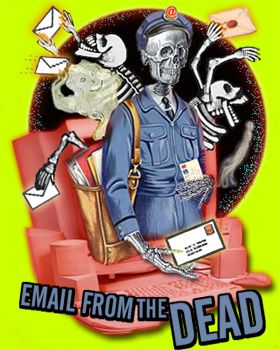
You're online and decide to check your email. A couple of messages: one from a friend who sends the arrival time for his annual visit, another from your grandma who lists all the ingredients for your favorite cookie recipe. Terrific, except for one little thing -- grandma's long dead. Uh-oh.
As Internet use has boomed, so have the number of people who claim to have been emailed by deceased loved ones -- or even enemies. Claim is the operative word here. I've reported on paranormal issues for many years and have heard people claim lots of weird stuff. Like being followed by fist-sized mini-UFOs or channeling Richard M. Nixon. Some of it is as believable as the rubber alien heads on Star Trek. But much of it falls into the vast gray area between the rational, scientifically replicable and the obviously insane.
According to Brad Steiger, a frequent guest on the Art Bell show, high-tech messages from the dead should come as no surprise. "Phone calls from the dead have been recognized for decades by the paranormal community. And there are many audiotape recordings containing the voices of deceased persons. In a sense, emails simply represent a technological advance over other forms of communication. It's simply a fact that the dead want to communicate with the living. Anyway. Anyhow."
Brad has authored 150 books on paranormal phenomena. His recent book, Touched by Heaven's Light (Signet) is replete with accounts of what is known to paranormal researchers as "electronic spirit communication." "If you believe as I do, that the dead often have unfinished business on earth, then you can understand that emails are just another route to the living, especially to loved ones, relatives, and other significant individuals," said Steiger.
But even Brad doesn't take all reports at face value. "Certainly, not every claim of an email from a deceased person holds up under careful analysis. Some stories I've heard are plainly ludicrous. But it's the anecdote that raises the little hairs on the back of my neck which tells me the story rings true. And these days, I'm collecting more reports than ever from reliable individuals with authentic tales to share." But what about the nature of these messages? Are they Exorcist-level, gut-wrenching scary? Or mundane? Like, "Hey, I know I'm dead, but I'm still your mother. Clean your room -- and comb your hair, for chrissakes!"
According to Steiger, "In the tradition of most spirit communications, these emails most often send a message of comfort. The deceased reassure the living that they are at peace in the spirit world and that their affection for those left behind continues."
A case in point is that of a graduate student in biology who received an email from a favorite professor who'd recently passed away. "The student had been laboring on a complex experiment under the guidance of the professor," asserted Steiger. "But he'd become unsure of his ability to complete the work alone. He was ready to throw in the towel and give up his grant when a subjectless email appeared on his home computer. It contained a message from the professor assuring him that he was on the right course -- with knowledge of the grad student's work that could only have come from his kindly mentor. An interesting twist: Although the grad student reported the message to a paranormal researcher, he never quite believed his own experience and always looked for a scientific explanation. Indeed, he had no prior interest in the paranormal nor a belief in an afterlife -- which made his claim all the more intriguing to the investigator.
In another case, a London art gallery owner received an email from a dead artist, a longtime enemy of hers. "The gallery owner had a running battle with the struggling artist for years," recounted Steiger. After being rejected by her repeatedly over the years, the frustrated artist died suddenly of massive heart failure. The gallery owner was devastated, fearing that he'd died from a broken heart caused by her refusal to sell his work. "But one morning, an email under the artist's name appeared. Shaking with anxiety, the gallery owner read it twice. The artist's message absolved her of any role in his death. He had died from a congenital problem, not the stress of rejection. Apparently, he needed closure in the matter so he could move on into the spirit world."
Instead of a paranormal explanation, could the email have been simply a cruel prank? Was the recipient a hoaxster who enjoyed creating a stir? Steiger noted, "If I'm presented a case, I have two considerations: First, does the email contain significant details known only to the recipient and the deceased? Second, can the email be traced to its origins by sophisticated technicians? When these aspects are fully investigated, I'm a lot more comfortable with my conclusions."
With the Net in its infancy, we'll no doubt be hearing much more about emails from the dead. But think about it. Do you really want to hear from Dear Departed Dad telling you, yet again, to get your act together, son?
Peter Fenton is creator of Truth Or Tabloid!, a free email newsletter and simple-minded game.
